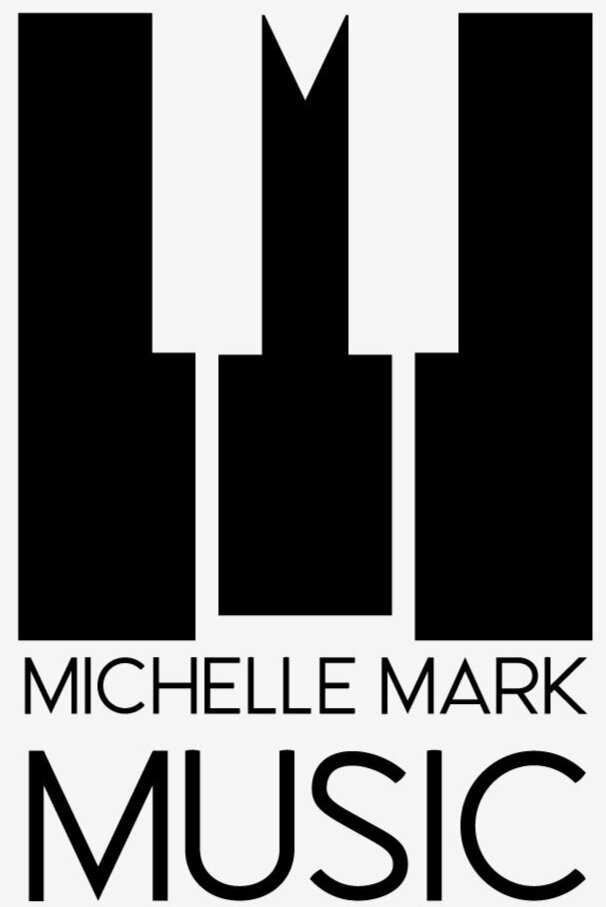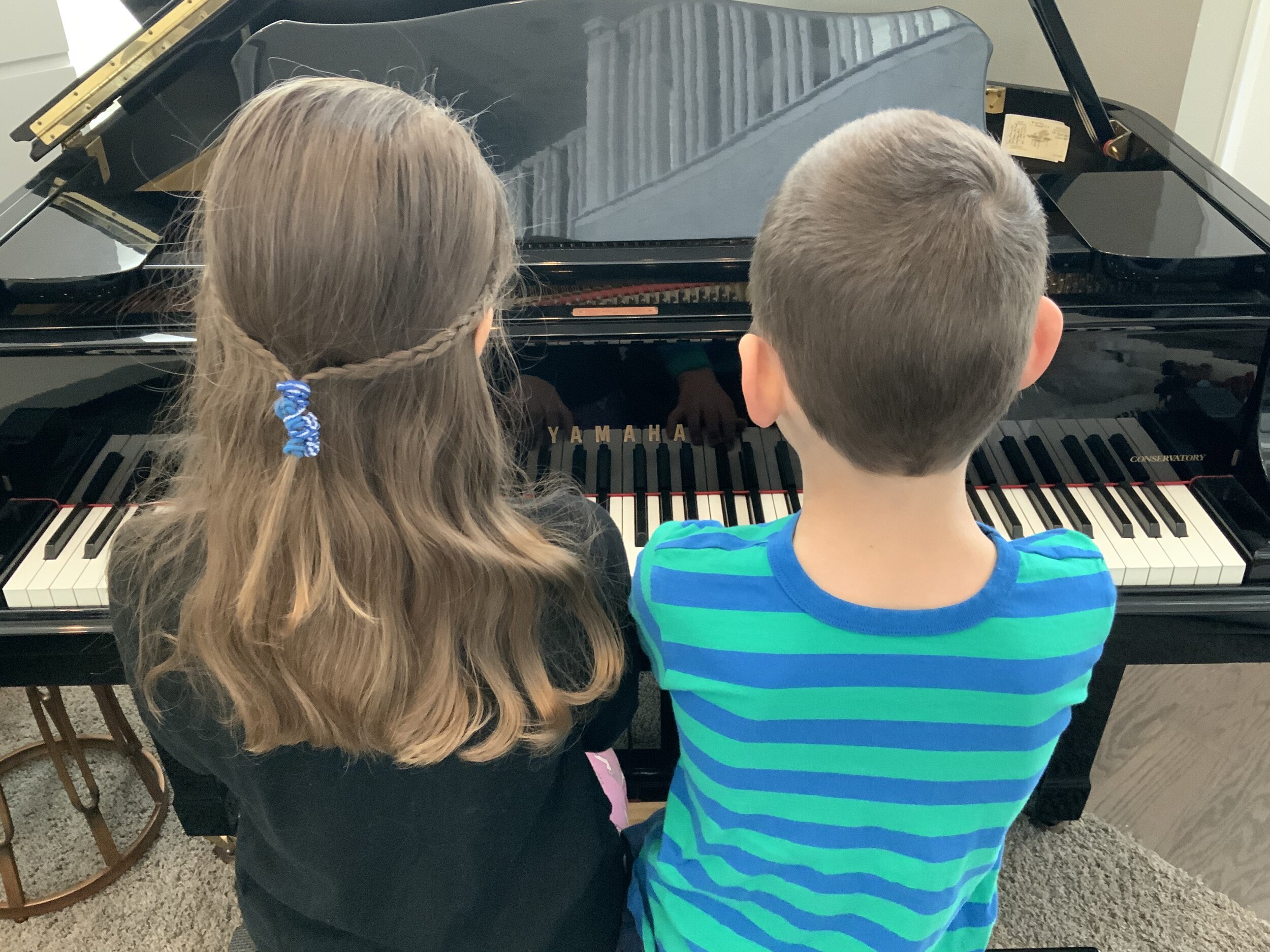
piano programs
Piano Pups
(lessons for 5-year-olds)
I am a huge believer in piano lessons for this age and group (and preschool, too!) if the curriculums are thought out and meaningful. These young learners need lots of off-bench games and movement during instruction to introduce them to rhythmic, aural and technical skills.
There are a lot of similarities to the younger side of my Little Paws Program, but this age requires more supplemental materials which is why I do not group them together. Instead, we might slowly start an exploration of the Little Paws curriculum, but with lots of extra added activities that help bridge the developmental gap between age groups. Alternatively, we might take a completely different approach all together! No matter what path we take, you can be sure it will include lots of FUN!
I bring the creativity!
Do I sense your child is losing focus? I’ll pull out my box of silly musical cards to get him or her active and still learning while we take a “break.”
Is your child feeling the need to create? We’ll move over to my keyboard and do an improvisational exercise. We might even split the keyboard into various sounds to create a truly unique and beautiful song. Or perhaps we’ll compose a melody using my story board cards. If your child gets inspired, we can always put their masterpiece into music notation software to preserve and later build upon the composition!
Does your child love percussive instruments? I’ll use them to go over simple rhythm patterns. I might even tape a number of patterns all over my glass door so your child can throw sticky balls to determine which rhythm to play.
Little Paws Piano Program
(Lessons for Children 6–9-year-old)
Whether brand new to piano, or whether they’ve taken years of lessons, I’ve discovered that there are two essential elements that act as a glue for all my students in the Little Paws program:
(1), everyone uses stuffed animals to learn proper technique at the piano; and
(2), all beginners ease into the note reading process.
Students begin reading on landmark (memorized) notes and then use the space between notes to read music (intervallic reading). If your child comes to me already reading music, I will have them steer clear of using outdated mnemonic devices (i.e., Every Good Boy Deserves Fudge) because they are not effective in developing strong sight-reading skills. Instead, they will learn a new way to read music that will pay off greatly over time!
Why the name Little Paws?
The very first technical animal the kids meet is Larry the Lion. Using Larry, children are taught to keep their hands in a paw-like shape while freely dropping on the keys. This helps kids get out of the mindset that all five fingers need to be on placed on separate white keys, which curl fingers and adds lots of unwanted tension!
In addition,
I leave plenty of room for working on personalized student goals! I believe it’s important to remain flexible and add material that is student-driven, so I always listen to what my students want and design my lesson plans accordingly. Some children might want to focus on classical music while others might really enjoy improvisation or a more contemporary repertoire. I take all of this into account when I plan for each lesson and no matter which route children prefer, I give everyone exposure to all sorts of music and activities.
Older Student Lessons
(10 years and up)
I find that older students usually have a good idea of what they want out of piano lessons, so I am happy to design a curriculum around your child’s individual goals. I love teaching classical music; however, if your child is more interested in playing popular music, that’s great, too! I have a huge repertoire and I am confident that all of my learners will find songs that they will love to work on.
I also want all of my students to have an understanding of the components that make up artistry in piano playing. All of this sets the stage for a deep lifelong appreciation and fulfillment in piano playing.
I often integrate Piano Safari for Older Students into the mix. It’s a sophisticated method filled with a mixture of beautiful reading and rote (pieces that don’t require note reading) songs.
I will incorporate the Taubman Approach into our technique work, which is the study of the movements that make up virtuoso playing. I am currently training in this amazing technique. Read about it here. www.golandskyinstitute.org
In order to maximize practice time, I teach many sound strategies to help my students effectively learn pieces.
In addition,
I provide highly personalized lessons for each and every student in my studio. I also leave room to explore various types of genres, as well as exposing students to improvisation and composition. For example, maybe they’ll make up a 4-chord progression and then add a melody using the notes of a pentatonic scale. This way they can practice chord inversions and scales while exploring their creative side.
Piano Pups
(lessons for 5-year-olds)
I am a huge believer in piano lessons for this age and group (and preschool, too!) if the curriculums are thought out and meaningful. These young learners need lots of off-bench games and movement during instruction to introduce them to rhythmic, aural and technical skills.
Little Paws Piano Program
(Lessons for Children 6–9-year-old)
Whether brand new to piano, or whether they’ve taken years of lessons, I’ve discovered that there are two essential elements that act as a glue for all my students in the Little Paws program:
(1), everyone uses stuffed animals to learn proper technique at the piano; and
(2), all beginners ease into the note reading process.
Older Student Lessons
(10 years and up)
I find that older students usually have a good idea of what they want out of piano lessons, so I am happy to design a curriculum around your child’s individual goals. I love teaching classical music; however, if your child is more interested in playing popular music, that’s great, too! I have a huge repertoire and I am confident that all of my learners will find songs that they will love to work on.
“Michelle is a fantastic piano teacher. Both my kids had taken a more traditional lesson format before switching over. Every week was a fight to get them to practice and they constantly complained about piano. We have been with Michelle for two years now and I can honestly say she has brought the fun back to piano. My kids love learning and practice is exciting. They look forward to lessons each week. Michelle makes lessons fun with age-appropriate games and their playing has progressed so nicely! I would highly recommend Michelle to anyone!”
Erin Aschman – parent
“Our 9-years-old daughter has been taking piano lessons with Michelle for the last two years. Michelle makes the lessons engaging, fun, and rigorous all at the same time. Michelle is proactive about incorporating new teaching methods, structuring lessons appropriate to our daughter's skill level and motivating her to improve. Not only has our daughter shown consistent progress under Michelle, but she has developed a deep love for piano.”



